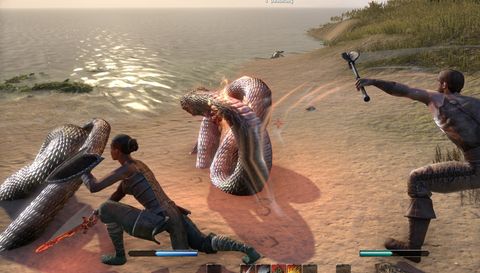Our Verdict
A few well-designed systems struggle to overcome lifeless presentation. Capable, but ultimately hard to recommend.
PC Gamer's got your back
Every modern Elder Scrolls game has had a moment near the beginning where you step out into a new landscape and think I've never been somewhere like this before. In Morrowind it hit as you left Seyda Neen and realised that the road ahead went in two directions, and that you could follow either of them, and that each direction would take you on an entirely different journey through the world. In Oblivion it occurred when you escaped out onto the edge of Lake Rumare and saw the hills rise ahead of you along the road to Bruma. In Skyrim you emerged onto a mountainside with the Throat of the World on one side, the valley of Falkreath on the other, and a dragon in the skies above.
I have spent thirty hours playing The Elder Scrolls Online and I'm still waiting for that moment. I'm waiting for anything like that moment. I'm waiting for the point when this MMO sits up and makes a claim to be anything but familiar. This isn't simply about whether The Elder Scrolls Online works as an Elder Scrolls game in its own right—it doesn't, let's put paid to that notion now—but whether it can justify being one of the most expensive games on PC. Those 'stepping into the light' moments weren't just about showing off fancy new tech; they were a promise. You are going to have an adventure. This is going to be worth your time. It does not seem unjust or unrealistic to hold The Elder Scrolls Online to account along similar lines.
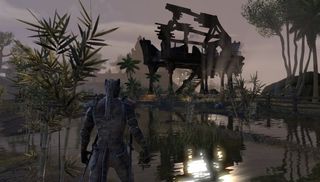
At the beginning of the game your character escapes from prison in the daedric realm of Coldharbour. Your soul has been stolen by the daedric prince Molag Bal, and with the help of some new allies you return to Tamriel as the Vestige, a Chosen One among a great many other Chosen Ones. From there you are looking at around a hundred hours of questing to reach the level cap of 50, with competitive play available from level 10 and story-advancing special missions occurring every five levels or so. This is an MMO of the prescriptive, content-driven sort: where Morrowind might have spurred you on with the promise of the unknown, The Elder Scrolls Online furnishes you with an experience you've already had if you've played a fantasy MMO in the last couple of years. Its happiest players will be the ones who are looking for a new leveling curve to surmount, and that's fine in principle—but execution matters too.
I'm waiting for the point when this MMO sits up and makes a claim to be anything but familiar.
Your character belongs to one of three factions, each presiding over a third of ESO's truncated take on Tamriel. The Daggerfall Covenant stretches from High Rock in the northwest down to the northern half of Hammerfell. The Ebonheart Pact covers an area stretch from mainland Morrowind to the eastern part of Skyrim, and the Aldmeri Dominion includes the easternmost part of the Summerset Isles, Valenwood, and Elsweyr. Cyrodiil, the setting of Oblivion, sits in the middle as a dedicated player vs. player zone.
The geographical area the game covers is expansive, but don't calibrate your sense of scale against the other games in the series. A limited draw distance and reliance on repetitive buildings and scenery makes the game feel substantially smaller than it looks on a map. The problem is exacerbated by the fact that every faction offers a single zone for players of a given level range: unless you commit heavily to PvP, you will be seeing a lot of the same sorts of environments. My journey from level 1 to 20 with a Daggerfall Covenant character took 26 hours, time almost entirely spent in green fields, grey cliffsides and brown cottages. Landmark Elder Scrolls locations like the cities of Daggerfall and Wayrest are much the same as each other. Dedicated fans of the series may have fantasised about visiting these places in a modern iteration, but I doubt they fantasised about visiting them like this.
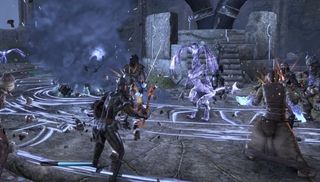
The tasks you perform fall into familiar categories—kill lists, fetch quests, and simple object finding. A few quests have more of a social or riddle-solving aspect and these tend to be the better ones, particularly when they allow you to use the game's basic persuade and intimidate skills to alter the course of events. Typically, however, you're going to be running around fighting for the vast majority of your time in the game.
The combat system hybridises the traditional fantasy MMO 'rotation' system—where a player cycles through a particular series of skills and magical powers—with skill-based attacking and blocking closer to the singleplayer Elder Scrolls games. The vast majority of battles feel far more like the former than the latter: generally, encounters are forgiving enough that it doesn't matter if you screw up a block or fail to use your abilities at the right time. This applies to stealth, too: every character can sneak about, but it's faster, easier, and more rewarding to fight everybody you see.
The combat system gets better as the difficulty level rises. I've built my character into a sword-and-board frontline fighter, and in group dungeons that means taking the tanking role. In addition to the familiar parts of the job—hammering the 'taunt' key to make sure I'm the one getting hit, keeping my defensive bonuses up—I also have to watch out for special attacks I can parry or spells that I can rebuff with a well-timed block. Seeing a heavy overhand blow coming in, reacting and catching it on my shield with a heavy 'thunk' is a good feeling. It's not groundbreaking, but it's a success for the game.
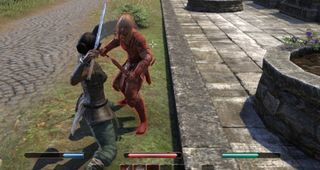
It's a good thing, then, that the game's skill system allows you to customise your approach to combat from the beginning of the game. You select skills by spending points in a range of disciplines, the majority of which are available to every player. Your choice of class at character creation grants you three sets of skills that nobody else will have, but beyond them you're free to mix and match armour types, weaponry, and crafting disciplines as you will. It's also possible to add new skill trees by joining organisations like the Fighters and Mages guilds, each of which have their own quest lines.
It's also possible to be infected with vampirism or lycanthropy and gain access to new skill trees with appropriate benefits and drawbacks. This is a nice idea, and demonstrates the versatility of the skill system. It does, however, have an amusing and detrimental effect on the game's tone: vampires and werewolves can pass on their curse to other players once per week, and it's common to see players in cities offering large sums of money for the chance to get bitten. The idea is fine on paper, but crumples when exposed to actual players.
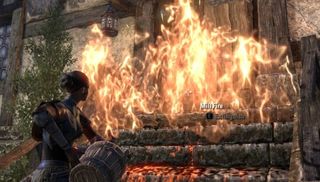
This is true elsewhere. One of The Elder Scrolls Online's biggest weaknesses as an MMO is that it often becomes a worse game when large numbers of players are involved in the same activity. While questing in the High Rock area of Stormhaven I was directed to a monastery that was under attack by bandits. I was given two quests: put out six fires, and deliver healing to four injured monks. Credit for completing these objectives is only granted to the player that performs them, which means that I was put in indirect competition with every other player in the area—and given the linear nature of the game's zone, that means a lot of other people.
The monastery might have been on fire, but there weren't enough fires for everybody: which meant hanging around waiting for fires to respawn so that I could get the credit for putting them out. Badly-designed quests like this one are common, and even when your objective is more deftly constructed you are always aware of the conga-line of players waiting to do the exact same thing that you are doing. This takes the game to some strange places: I'll never forget the time I traveled back in time in the guise of an ancient warrior only to find a room full of doppelgangers jumping about, dancing, and waiting for a boss to spawn. Immersive it isn't.
Narrative isn't necessarily important to an MMO, but The Elder Scrolls Online's tepid writing and lamentable voice acting act to the severe detriment of the game's atmosphere. A handful of actors play the majority of characters you'll run into, Oblivion-style, and as a result I'm fairly sure that every quest giver in the Daggerfall Covenant is the same person wearing a different hat and beard. The storytelling is more adept in the main plotline, and later conversations between Alfred Molina's Jagar Tharn, Michael Gambon's Prophet and Jennifer Hale's Lyris Titanborn have a bit of personality to them. You'd hope so, though, with that amount of talent involved.
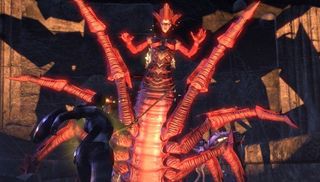
That's not to say that Bethesda's astronomical casting spend has been entirely justified. Malcolm McDowell's Molag Bal sounds like he's very far away for reasons I don't quite understand. Bill Nighy as High King Emeric sounds vaguely amused and unfazed by everything that happens; like somebody's cool granddad having fun with the word 'daedra'. At least he's having fun, I suppose.
That's the experience of leveling in The Elder Scrolls Online, then: you pick up prescriptive tasks from lifeless characters and join the queue to perform them with dozens of other players. There are treasures to discover and the odd optional cave to explore if you wander off, but the things you'll see and the rewards you'll uncover don't really match up to the effort. The crafting system is well thought-out and expansive, but the abundance of materials and lack of a formal trading system means that there isn't much of an economy to participate in. At its best, this is a decent iteration on a very familiar RPG format. At its worst, it's boring.
The Elder Scrolls Online's player vs. player mode is an oddity.
For all of these reasons, The Elder Scrolls Online's player vs. player mode is an oddity. It's accomplished, coherent, and takes advantage of the engine's ability to render lots of players without slowdown. It justifies the presence of the faction system, which elsewhere seems like a pointless restriction on your freedom of movement until it is lifted when you hit the level cap.
From level ten onwards, you can choose a PvP campaign to participate in. This is effectively your server or shard, given that the game otherwise lacks them. From there, all three factions battle to control a network of forts, resource camps and castles in Cyrodiil. The system resembles Guild Wars 2's World vs. World combat, which is unsurprising given that both games have a common ancestor in Dark Age of Camelot. Participating in battles earns its own currency which is spent on siege equipment and castle repairs: even a disorganised army participates in a cooperative economy that encourages a strong sense of collective spirit.
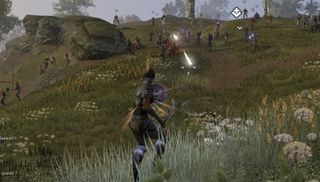
The majority of encounters are decided by whichever side has the most bodies: an old problem with this form of PvP, and not something that ESO satisfactorily solves. What it does manage to do is to run well even as large groups clash together. You might not be able to see what's going on, but by keeping your spells and abilities in play you can at least make yourself useful. Sieges tend to be more interesting than field battles because they encourage a variety of roles: ambushers waiting near postern doors, siege crews maintaining shields to protect their catapults and battering rams, assault teams waiting to go when the doors fall.
I'm a little concerned about the mode's overall structure. With three factions fighting over a single (albeit large) map, offensives by a single party often struggle to overcome the opportunistic resistance offered by two factions fighting against a common foe. This creates a kind of eternal war around familiar flashpoint areas, although the presence of permanent objectives—Elder Scrolls that can be stolen to give your side a bonus—does provide a sense of who is 'winning' at a given time. After a while, however, I can see endless war wearing a little thin. Overall, though, it's the game's best feature. Unlike the rest of the game, where competent design can't overcome patchy presentation, PvP allows spectacle to emerge naturally as players congregate, cooperate and clash.
It is, nonetheless, the exception. My enthusiasm for The Elder Scrolls Online's competitive side doesn't stack up against the time I have spent feeling drained by drab questing or restricted by a world ensconced in fog. This is an MMORPG of moderate scope with a few good ideas and the resources invested in it seem sufficient to expect new dungeons, daily quests and armour sets to collect at a decent clip for the next couple of months. If you're tired of your current fantasy haunt and looking for somewhere to transfer your guild, this game may suit you for a time. For everyone else, though, I'd advise caution. There's no game that I'd be happy recommending on the basis that it's at best 'okay' for thirty-plus hours. 'Okay' isn't good enough when you're facing down this much of a premium, and I can't imagine paying a monthly fee to visit somewhere I've been many times before.
A few well-designed systems struggle to overcome lifeless presentation. Capable, but ultimately hard to recommend.
Joining in 2011, Chris made his start with PC Gamer turning beautiful trees into magazines, first as a writer and later as deputy editor. Once PCG's reluctant MMO champion , his discovery of Dota 2 in 2012 led him to much darker, stranger places. In 2015, Chris became the editor of PC Gamer Pro, overseeing our online coverage of competitive gaming and esports. He left in 2017, and can be now found making games and recording the Crate & Crowbar podcast.

The Elder Scrolls Online dev says the 'metaverse' is sinking because it ignored 20 years of games doing the exact same thing: 'It's not new, and they should stop treating it like it's new'

The Elder Scrolls Online has made nearly $2 billion in its lifetime, 9 years after the big comeback that doubled its player count overnight
